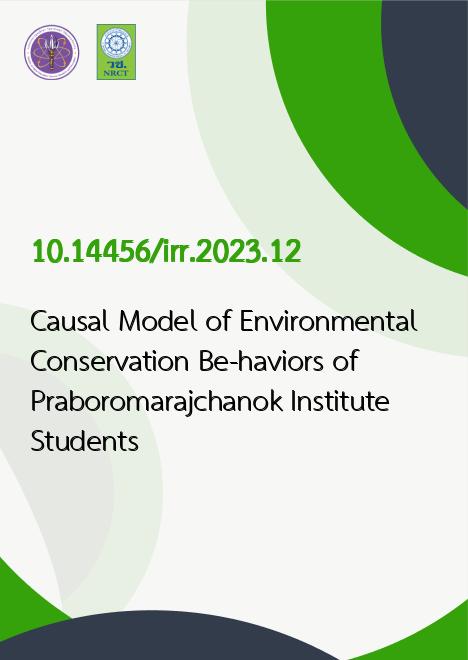
|
Causal Model of Environmental Conservation Be-haviors of Praboromarajchanok Institute Students |
|---|---|
| รหัสดีโอไอ | |
| Creator | Paisit Jirarattanasopa |
| Title | Causal Model of Environmental Conservation Be-haviors of Praboromarajchanok Institute Students |
| Contributor | Piyaruk Pradabphetrat, Vichit Rangpan |
| Publisher | Phetchaburi Rajabhat University |
| Publication Year | 2566 |
| Journal Title | Interdisciplinary Research Review (IRR) |
| Journal Vol. | 18 |
| Journal No. | 5 |
| Page no. | 37-45 |
| Keyword | Causal models, Environmental conservation behaviors, Praboromarajchanok institute (PBRI) |
| URL Website | https://ph02.tci-thaijo.org/index.php/jtir |
| Website title | Interdisciplinary Research Review (IRR) |
| ISSN | 2697-536X |
| Abstract | This research aims to: 1) study the direct and indirect influences of factors affecting the environmental conservation behaviors ofPraboromarajchanok Institute students; and 2) develop a causal relationship structure model of the environmental conservationbehaviors of students in Praboromarajchanok Institute by identifying elements from the theories of planned behavior, protectionmotivation theory, and value-belief-norm theory. The sampling for this survey research comprises 480 students from 8 collegesof the Praboromarajchanok Institute, which were obtained by multi-stage sampling. The research variables consisted of 7 latentvariables, namely, attitude toward environmental behaviors, perceived efficacy in environmental behavior control, perceivedthreats to environmental behaviors, personal values, subjective norms, environmental behavior intention, and environmentalconservation behaviors. All latent variables were measured from 24 observed variables using a questionnaire. The statisticsused in data analysis were frequency, percentage, mean, standard deviation, and causal relationship structure model analysis.The research revealed that level of environmental conservation awareness of the Praboromarajchanok Institute students washigh, and the results of the analysis of the causal structure relationship for the environmental conservation behaviors of stu-dents fit with the empirical data could explain 78% of the variance in environmental conservation behaviors of students underPraboromarajchanok Institute (PBRI). Personal value had the highest effect on the environmental conservation behavior of thestudents, followed by environmental behavior intention, subjective norms, perceived environmental behavior control, perceivedthreats to environmental behaviors, and attitude towards environmental behaviors, respectively. In addition, it was found that at-titude towards environmental behaviors, subjective norms, and perceived threats to environmental behaviors directly influencedenvironmental behavior intention. The perceived efficacy of environmental behavior control directly influenced environmentalbehavior intention and environmental conservation behaviors. For personal values, there was an indirect effect on environ-mental conservation behaviors through perceived efficacy in environmental behavior control, attitude toward environmentalbehaviors, subjective norms, perceived threats to environmental behaviors, and environmental behavior intention. Furthermore,environmental behavior intention was found to have a direct influence on environmental conservation behaviors. |